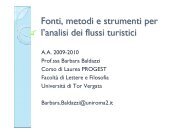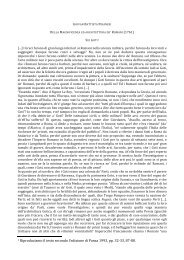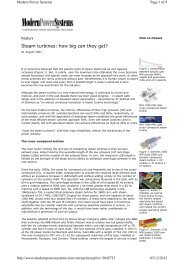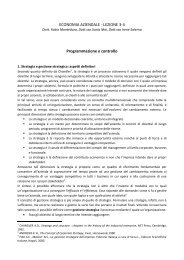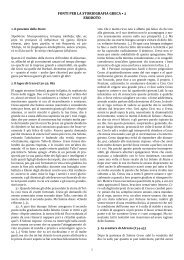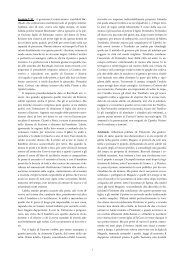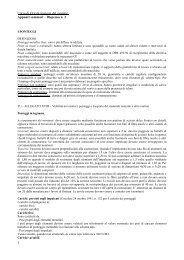Italian Journeys
Italian Journeys
Italian Journeys
You also want an ePaper? Increase the reach of your titles
YUMPU automatically turns print PDFs into web optimized ePapers that Google loves.
Università di Roma “Tor Vergata”Letteratura Angloamericana I Mod. BA.A. 2011/12William Dean Howells<strong>Italian</strong> <strong>Journeys</strong>ROMAN PEARLS.The first view of the ruins in the Forum brought a keen senseof disappointment. I knew that they could only be mere fragmentsand rubbish, but I was not prepared to find them so. I learned thatI had all along secretly hoped for some dignity of neighborhood, someaffectionate solicitude on the part of Nature to redeem these works ofArt from the destruction that had befallen them. But in hollowsbelow the level of the dirty cowfield, wandered over by evil-eyed buffaloes, and obscenelydefiled by wild beasts of men, there stood here an arch, there a pillar, yonder a cluster of columnscrowned by a bit of frieze; and yonder again, a fragment of temple, half-gorged by the façade of ahideous Renaissance church; then a height of vaulted brick-work, and, leading on to the Coliseum,another arch, and then incoherent columns overthrown and mixed with dilapidated walls—merephonographic consonants, dumbly representing the past, out of which all vocal glory had departed.The Coliseum itself does not much better express a certain phase of Roman life than does the Arenaat Verona; it is larger only to the foot-rule, and it seemed not grander otherwise, while it is vastlymore ruinous. Even the Pantheon failed to impress me at first sight, though I found myself disposedto return to it again and again, and to be more and more affected by it.Modern Rome appeared, first and last, hideous. It is the least interesting town in Italy,and the architecture is hopelessly ugly—especially the architecture of the churches. The Papalcity contrives at the beginning to hide the Imperial city from your thought, as it hides it insuch a great degree from your eye, and old Rome only occurs to you in a sort of stupidwonder over the depth at which it is buried. […]Indeed, it seems to me that all moisture of romance and adventure has been wellnighsucked out of travel in Italy, and that compared with the old time, when the happy wayfarerjourneyed by vettura through the innumerable little states of the Peninsula,—halted every other mileto show his passport, and robbed by customs officers in every color of shabby uniform andevery variety of cocked hat,—the present railroad period is one of but stale and insipid flavor.Much of local life and color remains, of course; but the hurried traveller sees little of it, and, passedfrom one grand hotel to another, without material change in the cooking or the methods ofextortion, he might nearly as well remain at Paris. The <strong>Italian</strong>s, who live to so great extent by thetravel through their country, learn our abominable languages and minister to our detestablecomfort and propriety, till we have slight chance to know them as we once could,—musical,picturesque, and full of sweet, natural knaveries, graceful falsehood, and all uncleanness.Rome really belongs to the Anglo-Saxon nations, and the Pope and the past seem to be carriedon entirely for our diversion.A Traveler from Altruria"What a charming young creature!" he began. "I never saw anything prettier than the way she hadof refusing my help, absolutely without coquetry or affectation of any kind. She is, as you said, aperfect lady, and she graces her work, as I am sure she would grace any exigency of life. Shequite realizes my ideal of an American girl, and I see now what the spirit of your country mustbe from such an expression of it."Prof. Elisabetta Marinomarino@lettere.uniroma2.it3
Università di Roma “Tor Vergata”Letteratura Angloamericana I Mod. BA.A. 2011/12I wished to tell him that while a country school-teacher who waits at table in a summer hotel is verymuch to be respected in her sphere, she is not regarded with that high honor which some otherwomen command among us; but I did not find this very easy, after what I had said of ouresteem for labor; and while I was thinking how I could hedge, my friend went on."I liked England greatly, and I liked the English, but I could not like the theory of theircivilization or the aristocratic structure of their society. It seemed to me iniquitous, for webelieve that inequality and iniquity are the same in the last analysis."At this I found myself able to say: "Yes, there is something terrible, something shocking, in thefrank brutality with which Englishmen affirm the essential inequality of men. The affirmation ofthe essential equality of men was the first point of departure with us when we separated fromthem.""I know," said the Altrurian. "How grandly it is expressed in your glorious Declaration!""Ah, you have read our Declaration of Independence, then?""Every Altrurian has read that," answered my friend."Well," I went on smoothly, and I hoped to render what I was going to say the means ofenlightening him without offence concerning the little mistake he had just made with the waitress,"of course we don't take that in its closest literality.""I don't understand you," he said."Why, you know it was rather the political than the social traditions of England that we brokewith, in the Revolution.""How is that?" he returned. "Didn't you break with monarchy and nobility, and ranks andclasses?""Yes, we broke with all those things.""But I found them a part of the social as well as the political structure in England. You have nokings or nobles here. Have you any ranks or classes?""Well, not exactly in the English sense. Our ranks and classes, such as we have, are what I maycall voluntary.""Oh, I understand. I suppose that from time to time certain ones among you feel the need of serving,and ask leave of the commonwealth to subordinate themselves to the rest of the state and performall the lowlier offices in it. Such persons must be held in peculiar honor. Is it something likethat?""Well, no, I can't say it's quite like that. In fact I think I'd better let you trust to your ownobservation of our life."Prof. Elisabetta Marinomarino@lettere.uniroma2.it4
Università di Roma “Tor Vergata”Letteratura Angloamericana I Mod. BA.A. 2011/12"But I'm sure," said the Altrurian, with a simplicity so fine that it was a long time before I couldbelieve it quite real, "that I shall approach it so much more intelligently with a little instruction fromyou. You say that your social divisions are voluntary. But do I understand that those who serveamong you do not wish to do so?""Well, I don't suppose they would serve if they could help it," I replied."Surely," said the Altrurian, with a look of horror, "you don't mean that they are slaves.""Oh no! oh no!" I said; "the war put an end to that. We are all free now, black and white.""But if they do not wish to serve, and are not held in peculiar honor for serving—""I see that my word 'voluntary' has misled you," I put in. "It isn't the word exactly. The divisionsamong us are rather a process of natural selection. You will see, as you get better acquainted withthe workings of our institutions, that there are no arbitrary distinctions here but the fitness of thework for the man and the man for the workdetermines the social rank that each one holds.""Ah, that is fine!" cried the Altrurian, with a glowof enthusiasm. "Then I suppose that theseintelligent young people who teach school inwinter and serve at table in the summer are in asort of provisional state, waiting for the processof natural selection to determine whether theyshall finally be teachers or waiters.""Yes, it might be stated in some such terms," Iassented, though I was not altogether easy in mymind. It seemed to me that I was not quite candidwith this most candid spirit. I added: "You know weare a sort of fatalists here in America. We are greatbelievers in the doctrine that it will all come outright in the end."Prof. Elisabetta Marinomarino@lettere.uniroma2.it5


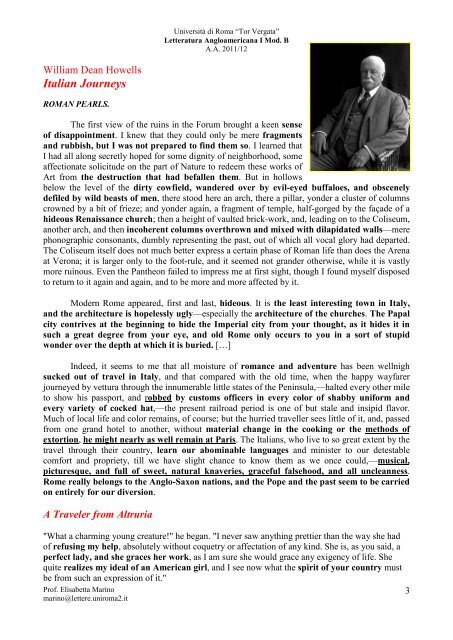
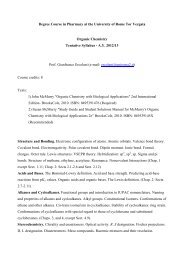


![Guinizzelli praised and explained (da [O] caro padre meo al XXVI ...](https://img.yumpu.com/50855933/1/185x260/guinizzelli-praised-and-explained-da-o-caro-padre-meo-al-xxvi-.jpg?quality=85)

